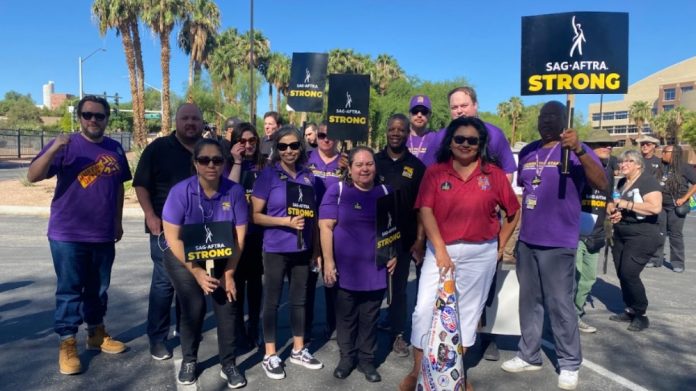Shortly after the breakdown in talks between SAG-AFTRA and the Alliance of Motion Picture and Television Producers (AMPTP) to end the three-month Actors Strike, one of the key issues being debated is being addressed by four United States senators, who have announced a draft bill aimed at holding companies liable for producing digital replicas of actors and other entertainers without their permission. The bipartisan proposed bill has the catchy acronym title “NO FAKES Act” or Nurture Originals, Foster Art, and Keep Entertainment Safe Act.
This bill, sponsored by Senators Chris Coons (D-DE), Marsha Blackburn (R-TN), Amy Klobuchar (D-MN), and Thom Tillis (R-NC), would prevent a person from producing or distributing an unauthorized AI-generated replica of an individual to perform in an audiovisual or sound recording without the consent of the individual being replicated. The person creating or sharing the unauthorized replication would be liable for the damages caused by the AI-generated fake. Exclusions are provided for the representation of an individual in works that are protected by the First Amendment, such as sports broadcasts, documentaries, biographical works, or for purposes of comment, criticism, or parody, among others.
If passed, the NO FAKES Act would offer historic federal IP protections against the misappropriation of voice and likeness performance in sound recordings and audiovisual works. It also prohibits the unauthorized use of digital replicas without the informed consent of the individuals being replicated.
Deadline has posted the draft of the bill, which you can download and read here.
Coons, who is the Chair of the Senate Judiciary Committee’s Intellectual Property Subcommittee, said about the bill, “Creators around the nation are calling on Congress to lay out clear policies regulating the use and impact of generative AI, and Congress must strike the right balance to defend individual rights, abide by the First Amendment, and foster AI innovation and creativity.”
Blackburn added, “Songwriters, actors and our incredibly talented creative community deserve the right to own their name, image, and likeness. This legislation is a good first step in protecting our creative community, preventing AI models from stealing someone’s NIL, and ensuring that those rights are given primary consideration under the law.”
SAG-AFTRA Presdient Fran Drescher was fully behind the announcement, as she stated, “A performer’s voice and their appearance are all part of their unique essence, and it’s not ok when those are used without their permission. Consent is key.”
SAG-AFTRA National Executive Director and Chief Negotiator Duncan Crabtree-Ireland agreed, saying, “The explosion in popularity and capability of generative artificial intelligence has flooded the internet with AI-created songs, videos band voice recordings which exploit the voices and likenesses of our members without consent or compensation. For our members, their voice and likeness is their livelihood. They spend a lifetime improving their talent and building their value. It is outrageous to think someone can undermine that value with a few prompts and clicks on a keyboard.”
The Motion Picture Association (MPA), whose many duties include handling piracy, also shared its thoughts on the NO FAKES Act. “Today Sens. Coons, Blackburn, Klobuchar, and Tillis released a discussion draft of a bill creating a new federal digital-replica right. We look forward to working with them, their staff, other members of Congress, and other stakeholders to ensure any eventual legislation establishes adequate protections against harmful uses of digital replicas without infringing on the First Amendment rights and creative freedoms upon which our industry depends.”



